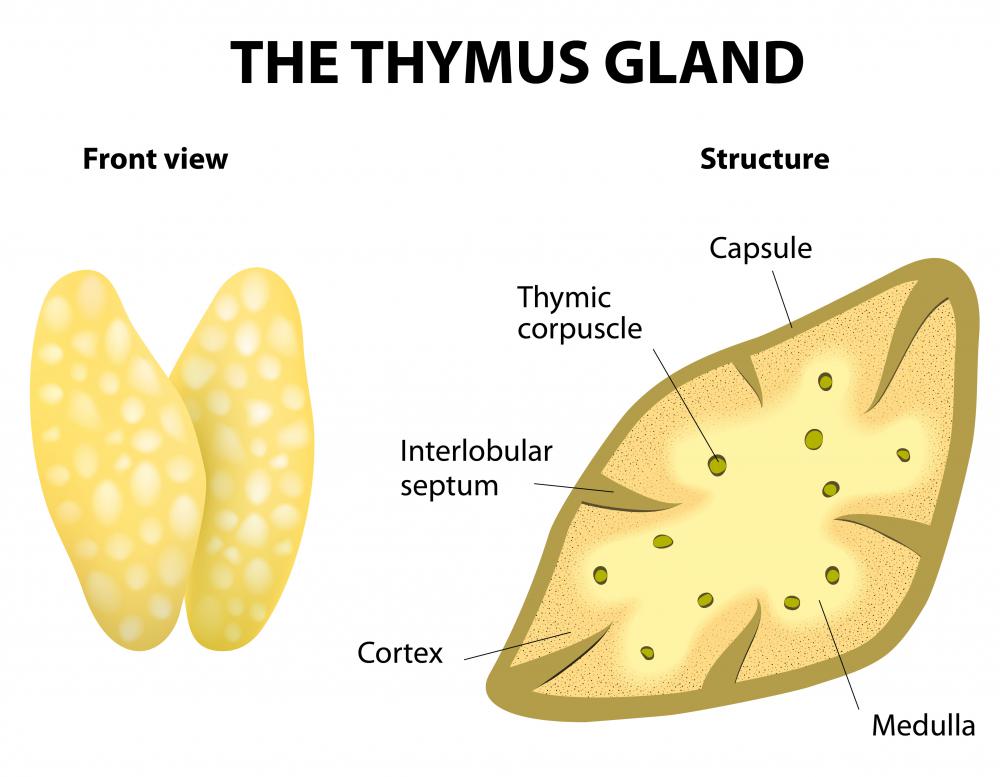At WiseGEEK, we're committed to delivering accurate, trustworthy information. Our expert-authored content is rigorously fact-checked and sourced from credible authorities. Discover how we uphold the highest standards in providing you with reliable knowledge.
What Is a Thymosin?
A thymosin is a hormone-like substance that plays an important role in regulating the immune system. Discovered in the mid-1960s, it was originally found in the thymus gland, but has also been located in many different human and animal tissues. Two significant types of thymosins include alpha groups, which play a role in DNA transcription and replication, and beta groups, which operate in the cellular cytoplasm and contribute to cell mobility. Thymosin beta 4, for example, which is found in blood platelets and fluids within wounds, helps to regenerate tissue following injuries. Different types of thymosins have been utilized in the detection and treatment of different diseases.
Extensive study of the immune system led to the discovery of thymosins. These polypeptides affect how T cells, the germ-killing white blood cells, function. Such molecules are found in people, animals, and most multicellular living things. They can also act on cells when added to a laboratory culture outside the body. How well someone fights off illnesses and infections appears to be directly related to the presence of normal thymosin levels.

Both alpha and beta thymosins are used to detect the presence of autoimmune diseases as well as cancer, which is often related to defects in the immune system. Traditional forms of treatment, such as radiation and chemotherapy, can worsen immune deficiencies. When certain types of thymosin is given to patients to boost their immune systems, people suffering from lung cancer have lived longer than they would otherwise.

The polypeptide compound influences the function of T cells, and even older patients may benefit when doctors administer thymosin, specifically thymosin alpha 1. Pre-existing health conditions can be alleviated, many people are less susceptible to colds, and being treated with the substance has improved or cured a variety of infectious diseases. To boost immune responses, the thymosin beta 4 molecule triggers the activity of an enzyme called terminal deoxynucleotidyl transferase within lymphocytes that come from the thymus.

Experiments have also suggested that thymosin may be effective in helping people fight Acquired Immune Deficiency Syndrome (AIDS). When it is administered with other treatments for the disease, the polypeptide stimulates T cells and builds up antibodies. A wide range of medical applications exist for substances normally found in the body, and using thymosin in medicine can boost the health of people that lack it or suffer from various conditions. Substances in this group appear to have a profound effect on the immune system at the molecular level, and affect how the body recovers from injury, cell damage, and disease.
AS FEATURED ON:
AS FEATURED ON:














Discussion Comments
I don't know what it's supposed to do, but it sounds like it helps with quite a few body functions, so it must improve something to do with sports.
@irontoenail - Well, it's going to be interesting in the future when they are able to clone cells as a matter of course and basically create an extra thymus gland for anyone from scratch.
As it said in the article, there are times when adding some of the thymosin hormones to the bloodstream can help people through sickness, like cancer. I'll bet one of the limitations to that is being able to replicate the chemicals and being able to do so in a way that the body won't reject.
When it comes down to it though, there are a lot of types of medicine that doctor's don't, strictly speaking, understand exactly how they work. They just know that they do. And that's true of a lot of different processes in the body as well. We are still only just scratching the surface of what we'll be able to do and prevent in the future.
The human body is so complex when it comes to all the chemicals that are constantly doing various things to keep you alive.
This is why I'm amazed that they have done as much as they have done with modern science and medicine. It's not a matter of mimicking a particular chemical, like thymosine beta 4, to help with a particular function. It has to be used at the right time, in the right way, as the right version. And it's going to be interacting with all the other chemicals that are in the bloodstream and cells. It's just completely complicated. And people wonder why it takes so long for new drugs to come out on the market.
Post your comments